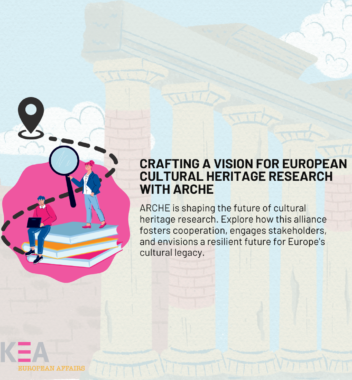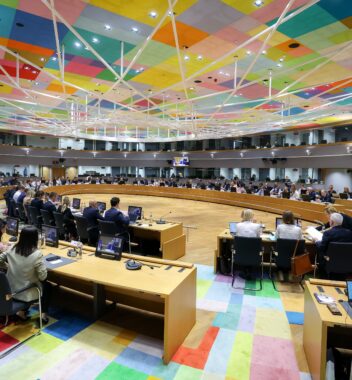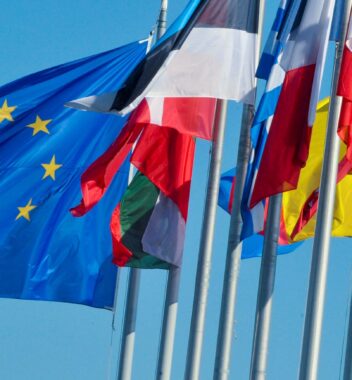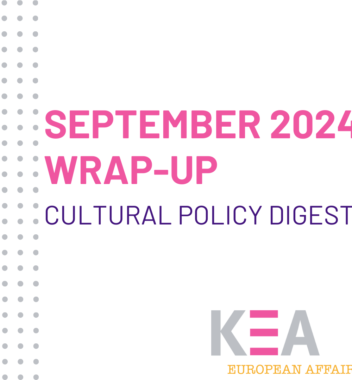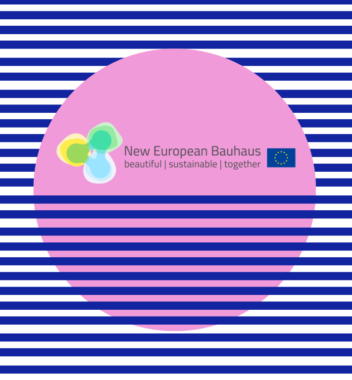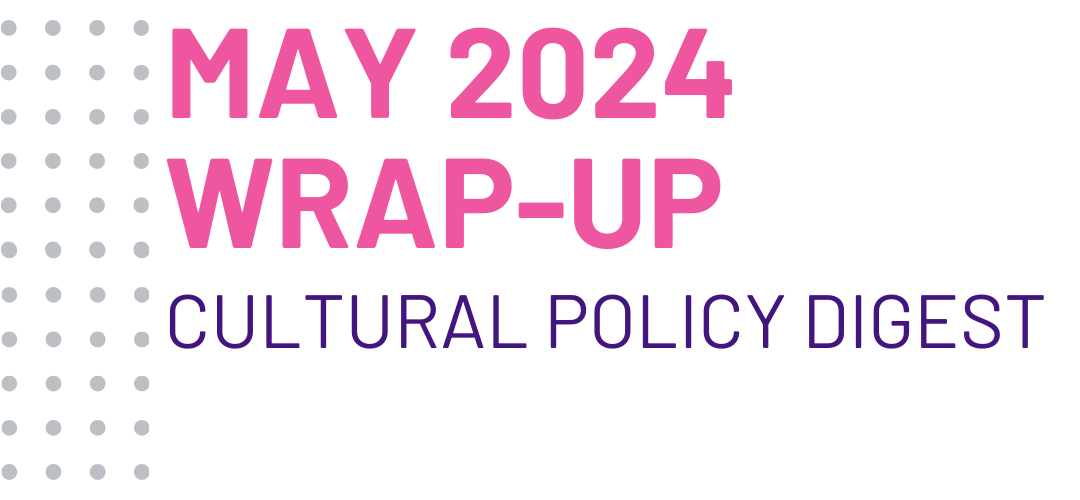
There is no other topic buzzing around Brussels with the upcoming European Parliamentary elections taking place this week. However, before diving into the election frenzy, we want to take the opportunity to look back and discuss the main parliamentary initiatives of the 2019-2024 mandate affecting the Cultural and Creative Sectors.
In this edition of KEA’s Cultural Policy wrap-up, coinciding with the final plenary session of the current European Parliament, we highlight the recent Activity Report published by the Committee on Culture and Education (CULT). This comprehensive document reviews significant initiatives and legislative efforts undertaken by the Committee over the past five years, shedding light on the significant strides and challenges faced in the domain of cultural policy.
While CULT has played a relevant role, it’s important to note that other committees, such as the Legal Affairs Committee (JURI) and the Internal Market and Consumer Protection Committee (IMCO), also had a stake in CCS related topics, mainly on issues such as copyright, the Digital Services Act (DSM) and the AI Act.
Join us as we delve into the key takeaways and implications for the future of European cultural policy.
Final activity report of the Committee on Culture and Education (CULT)
The parliamentary term began with unforeseen challenges, notably the COVID-19 pandemic, which disrupted work and tested resilience. The devastating impact on culture, education, and youth was compounded by challenges presented by the war in Ukraine, which further emphasized the importance of strengthening culture as a means for peace, solidarity, and democracy. The Chair of CULT, MEP Sabine Verheyen (EPP), positively evaluated the last mandate, saying, “Our journey has been one marked by challenges and triumphs alike, as we navigated the complexities of European policy-making with diligence and determination.”
The report highlights the Committee’s dedication to advocating for decent working conditions in the cultural sector, led by rapporteur Domènec Ruiz Devesa (S&D). It also ensured the proper legal basis for key cultural initiatives, including the 2021-2027 Creative Europe Programme and the European Capitals of Culture, spearheaded by Massimiliano Smeriglio (S&D) and Željana Zovko (EPP), respectively.
Furthermore, the Committee produced several own-initiative reports, urging the European Commission to take action on various cultural issues. These include the New European Bauhaus, better terms for authors and composers in the European music streaming market, and the need for transparent recommendation algorithms on streaming platforms, with significant contributions from Marcos Ros Sempere (S&D) and García del Blanco (S&D). Additionally, the future of the European book sector was addressed by Tomasz Frankowski (EPP). Monica Semedo (Renew) focused on the situation of authors and artists during the pandemic and cultural recovery in the EU. Semedo’s report called on member states to allocate 2% of their Recovery and Resilience Facility funds to culture — a call supported by many relevant organisations of the sector in the Cultural Deal for Europe campaign.
As the current parliamentary term concludes, it is noted that among the 29 members of the CULT Committee, at least 17 are seeking re-election, including almost all of the Committee’s leadership. At this point, it is uncertain how many members will remain in the future CULT Committee, which can present a challenge for continuity and building upon the current mandate’s work.
Legislative Reports
Creative Europe programme 2021-2027
The Creative Europe Programme 2021-2027, proposed by the Commission in May 2018, underwent extensive negotiations between the CULT Committee and the Council. The adopted Regulation incorporated many of CULT’s concerns, balancing legislative scrutiny and implementation flexibility for the Commission. The Regulation ensured only actions aligned with specified priorities could be funded, preventing the Commission from adding or removing actions outside the defined scope.
Creative Europe 2021-2027 has a larger budget of EUR 2.2 billion, divided into three strands: Culture (33%), MEDIA (58%), and Cross-Sectoral (9%). Parliament included a special focus on the music sector, alongside cultural heritage and literature. Third country participation required alignment with the Audiovisual Media Service Directive (AVMSD), with some exceptions allowed. The programme also prioritizes gender equality, supporting female talent and women’s careers, and emphasizes inclusion, particularly for people with disabilities.

European capitals of culture 2020-2033
The European Capitals of Culture (ECOC) initiative faced significant disruptions due to COVID-19 lockdown measures, which led to the closure of cultural venues and cancellation of events. The most affected were the ECOCs of 2020 and 2021, whose preparations were severely hampered. CULT adopted a single amendment to recognize the substantial human and financial investment made by these cities.
After accelerated interinstitutional negotiations, CULT unanimously endorsed the provisional agreement on the ECOC initiative for 2020 to 2033. The final act was published in the Official Journal by the end of 2020.

EU framework for the social and professional situation of artists and workers in the cultural and creative sectors
The joint CULT-EMPL legislative initiative responded to a key demand from the CULT own-initiative report on the situation of artists and cultural recovery in the EU by calling on the Commission to propose an EU-wide framework for the social and professional situation of artists and other cultural and creative sector (CCS) professionals. This framework involved two main legislative tools:
- A Directive on decent working conditions to ensure fair remuneration and working practices and to facilitate the correct determination of employment status for CCS professionals.
- One or more Decisions to establish a mechanism for structured cooperation and the exchange of best practices between Member States, including the creation of a new European platform focused on the social and professional situation of CCS workers, aiming to formulate quality standards.
The report also made specific recommendations on various issues, including the status of artists, cross-border mobility, fair remuneration and practices, education and career development, gender equality, artistic freedom, and digital challenges.
Key points of interest during negotiations included the legal basis, considering the EU’s limited competence in social affairs, particularly for the self-employed; the choice of legislative instruments, whether a decision, directive, or Council recommendation; the scope of the report, including whether to cover sports and entertainment sectors; and social conditionality, aiming to ensure that future EU programmes targeting the CCS incorporate a ‘social conditionality’ clause.

Own-initiative reports (INI)
The New European Bauhaus
The New European Bauhaus (NEB), launched in 2021, aims to connect the European Green Deal with daily life by integrating architecture, innovation, science, and design. The ITRE and CULT Committees welcomed its interdisciplinary approach but criticized the lack of concrete ideas, urging a focus on affordable living spaces, transforming underdeveloped areas, and addressing the exclusion of marginalized groups. The Committees requested an additional EUR 500 million through Horizon Europe for short-term funding and called for NEB to become a standalone EU program with dedicated funding from 2028.

Achieving an effective policy legacy for the European Year of Cultural Heritage
The 2018 European Year of Cultural Heritage (EYCH) was a significant achievement for CULT during the eighth legislative term. Parliament successfully guided the Commission to present and improve a legislative proposal, ensuring participatory implementation. The EYCH featured over 23,000 events across the Union, promoting engagement with and appreciation of Europe’s cultural heritage.
The Rapporteur’s approach focused on education and skills, digital cultural heritage, and economic potential and sustainability. The report emphasized cultural heritage as a valuable asset and called for a permanent platform for cooperation and coordination on cultural heritage policies at the Union level.

The situation of artists and the cultural recovery in the EU
The report addressed the significant impact of COVID-19 on the cultural sector, urging immediate assistance and emergency measures. Parliament called for culture to be prioritized in national recovery plans, with at least 2% of Recovery and Resilience Facility funds allocated to the sector.
Parliament also urged the Commission to propose a ‘European Status of the Artist’ to establish common standards for working conditions and minimum standards across Member States. It highlighted the need to address barriers to cross-border mobility and ensure fair treatment on digital platforms. The report emphasized defending artistic freedom and called for sanctions against Member States that infringe upon it.

The role of culture, education, media and sport in the fight against racism
The report proposed holistic approaches to combat racism, emphasizing involvement of culture, sport, and media. Recommendations included collecting comprehensive equality data, imposing stricter sanctions on media outlets for racist content, and establishing an EU code of ethics for sports.
Efforts to promote inclusivity in cultural and creative sectors, ensure diversity in staffing, and provide education on racism in schools were emphasized. The report also stressed the role of media, especially social media, in curbing racist content and hate speech.

Cultural diversity and the conditions for authors in the music streaming market
Despite the dominance of streaming platforms in the music market, there are no Union-level regulations governing the sector. CULT called for legislation to make platform algorithms transparent, ensure visibility of European works, and include a diversity indicator for genres, languages, and independent authors. It also proposed informing audiences about purely AI-generated works and investing more in European music, including local, niche, and vulnerable community artists. Additionally, support for authors in adapting their business models for the digital era was recommended.

The future of the European book sector
The report underscores the cultural and economic significance of the European book sector, highlighting its contribution to 12% of the Union’s cultural expense and its impressive turnover of over EUR 23 billion (2021 figures). It emphasizes the sector’s pivotal role in shaping cultural value and staunchly defends essential aspects such as balanced value chains, freedom of expression, editorial diversity, and independence from censorship.
In addressing various challenges, ranging from environmental sustainability to e-book interoperability and AI, the report provides targeted recommendations. Notably, it calls for enhanced support and promotion of European book circulation.

Artificial intelligence in education, culture and the audiovisual sector
In this report, CULT meticulously examined the risks associated with AI, such as data protection, discriminatory practices, and challenges to cultural and linguistic diversity.
Moreover, the report called for the establishment of a robust ethical framework governing algorithms to safeguard the Union’s cultural and linguistic diversity. This framework would address concerns related to the dissemination of fake news and disinformation, particularly through deep fakes. Beyond education, the report recognized AI’s potential in enhancing cultural tourism and bolstering efforts to combat the illicit trafficking of cultural artifacts. It underscored the need for proactive measures to harness AI’s capabilities while mitigating its potential risks, ensuring that these technologies serve the collective interests of society.

Esports and video games
Supported by an in-depth Policy Department study and extensive stakeholder consultations, the report delineated two main chapters: (1) analyzing challenges, opportunities, and proposing a European strategy for video games and esports, and (2) advocating for fair competitive gaming within a European framework.
To bolster the European video game ecosystem, the report advocated for the development of a European video game strategy, increased funding for Union productions through programs like Creative Europe and Horizon Europe, and the promotion of video games that showcase European values and diversity. Crucially, the report proposed the establishment of the European Video Game Observatory, an archive to preserve culturally significant European video games, and the integration of video games and esports into educational curricula. With the Commission and the Council committed to leveraging the potential of video games across culture, economy, and society, ongoing parliamentary engagement on this topic in the tenth legislative term is imperative.

EU sports policy: assessment and possible ways forward
Organised around seven thematic strands, it suggested actions such as establishing regular, high-level cooperation to develop accountable recommendations, creating an ‘EU Sport Coordinator’ for cross-sectoral cooperation, and promoting a European sports model based on principles of solidarity, sustainability, and fairness.
Concrete proposals included ensuring sports organizations respect established tournament frequencies, providing equal access to social and labour protections for professional athletes, involving fans in governance, and addressing gender equality in sports policy and legislation. The report also emphasized the need to increase targeted funding for grassroots sports and combat abuses in the gambling sector to protect minors and vulnerable individuals.

Implementation reports
Implementation of the New European Agenda for Culture and the EU Strategy for International Cultural Relations
Acknowledging progress in implementing the objectives of both policy documents, the report highlighted the need for updates. Additionally, it called for more focus on inclusion, diversity, accessibility, and simplifying access to Union funding, particularly for smaller entities.
Regarding the external dimension, the report urged improved coordination between the Commission and the EEAS, advocating for a coherent, long-term strategy on international cultural relations with sufficient funding. It proposed developing an EU cultural diplomacy toolbox to promote European culture abroad and support cultural and creative sectors in third countries.
Furthermore, the report emphasized the need to combat illicit trafficking in cultural goods and facilitate the return of cultural works to their places of origin as part of Member States’ external policy strategy.

Implementation of the Creative Europe Programme 2021-2027
Despite welcoming the budget increase, the report expressed concern over its absorption due to inflation. External factors like the pandemic and war of aggression against Ukraine affected the program’s initial years. Yet, Creative Europe 2021-2027 demonstrated success, fostering inclusivity and sustainability.
The report emphasized the program’s continued appeal, with growing interest across sectors. CULT reiterated the need for addressing pandemic impacts on creators and professionals. Recommendations included improving IT tools, monitoring greening priorities, promoting transparent AI use, and increasing funding for the next program cycle.

